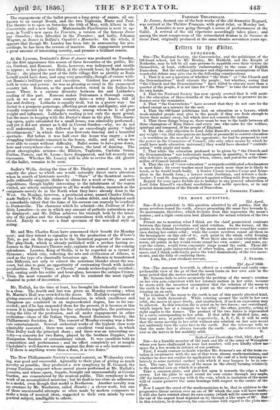At the Lyceum, Donizetti's Elixir d'Amore was produced on Tuesday,
for the first appearance this season of three favourites of the public, Bo- sio, Gardoni, and Ronconi. Rosie, however, was indisposed and unable to appear ; so her place was filled, at the eleventh hour, by Mademoiselle Maras : she played the part of the little village flirt as prettily as Bosio herself could have done, and sang very gracefully, though of course with- out Boasio's brilliant voice and execution. Gardoni has grown robust both in voice and person : he was as pleasing as usual in the enamoured country lad. Ronconi, as the quack-doctor, rioted in his Italian hu- mour. There is a curious diversity between his and Lablache's reading of this part. Ronconi makes Duleamara a thorough scamp, such as we see at our own country fairs—a witty knave, full of fun and drollery. Lablache is equally droll, but in a graver way : his doctor.is a pompous personage, affecting great state and dignity, and pro- foundly respected by the simple rustics, among whom he is of great weight and influence. Lablache's reading is not only the more genial, but the more in keeping with the Doctor's share in the plot. This charm- ing opera, quite calculated for a small house, was admirably performed ; and yet it did not attract as it did in Covent Garden—why, we do not well understand. It was followed by an exceedingly pretty " ballet divertissement," in which there was first-rate dancing and a beautiful spectacle. But before it was half over the house was empty.: a few straggling individuals remained in the boxes, stalls, and pit, whom we were able to count without difficulty. Ballet seems to have gone down, here and everywhere else—even in France, the land of dancing. The great choregraphic artistes—the Ellslers, Taglionis, Carlotta Grisis, Ceritos, Perrots, and St. Leons—have disappeared, and left scarcely any successors. Whether Mr. Lumley will be able to revive the old glories °LA-he ballet, remains to be seem


























 Previous page
Previous page